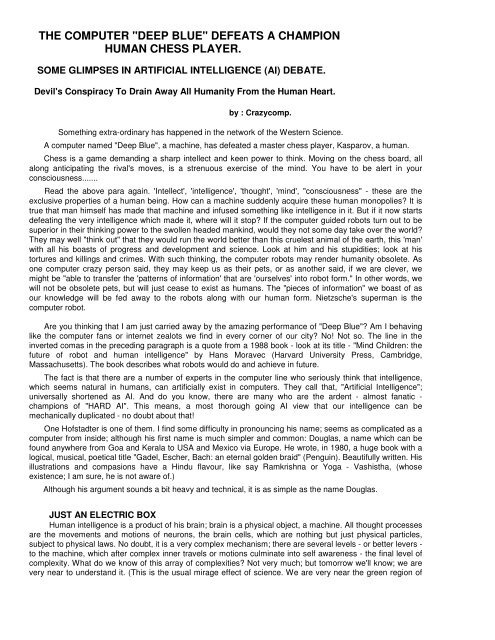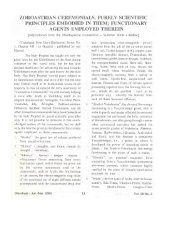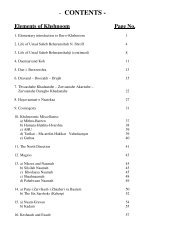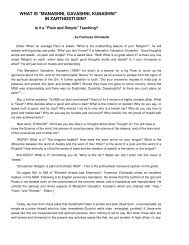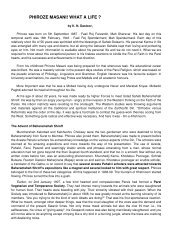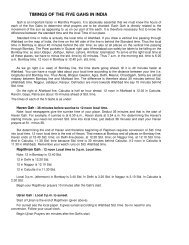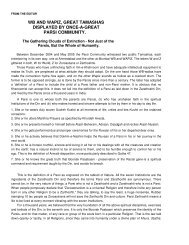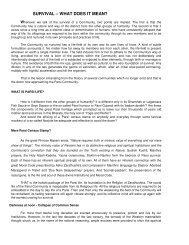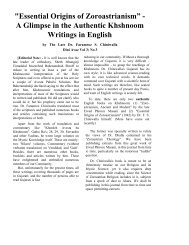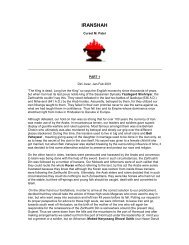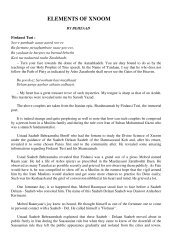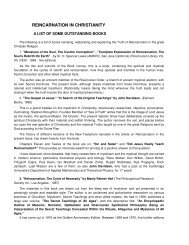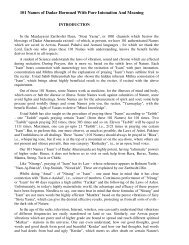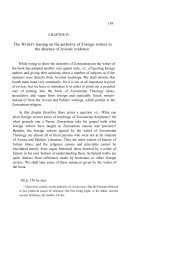(AI) Debate - Traditional Zoroastrianism: Tenets of the Religion
(AI) Debate - Traditional Zoroastrianism: Tenets of the Religion
(AI) Debate - Traditional Zoroastrianism: Tenets of the Religion
Create successful ePaper yourself
Turn your PDF publications into a flip-book with our unique Google optimized e-Paper software.
THE COMPUTER "DEEP BLUE" DEFEATS A CHAMPION<br />
HUMAN CHESS PLAYER.<br />
SOME GLIMPSES IN ARTIFICIAL INTELLIGENCE (<strong>AI</strong>) DEBATE.<br />
Devil's Conspiracy To Drain Away All Humanity From <strong>the</strong> Human Heart.<br />
by : Crazycomp.<br />
Something extra-ordinary has happened in <strong>the</strong> network <strong>of</strong> <strong>the</strong> Western Science.<br />
A computer named "Deep Blue", a machine, has defeated a master chess player, Kasparov, a human.<br />
Chess is a game demanding a sharp intellect and keen power to think. Moving on <strong>the</strong> chess board, all<br />
along anticipating <strong>the</strong> rival's moves, is a strenuous exercise <strong>of</strong> <strong>the</strong> mind. You have to be alert in your<br />
consciousness.......<br />
Read <strong>the</strong> above para again. 'Intellect', 'intelligence', 'thought', 'mind', "consciousness" - <strong>the</strong>se are <strong>the</strong><br />
exclusive properties <strong>of</strong> a human being. How can a machine suddenly acquire <strong>the</strong>se human monopolies? It is<br />
true that man himself has made that machine and infused something like intelligence in it. But if it now starts<br />
defeating <strong>the</strong> very intelligence which made it, where will it stop? If <strong>the</strong> computer guided robots turn out to be<br />
superior in <strong>the</strong>ir thinking power to <strong>the</strong> swollen headed mankind, would <strong>the</strong>y not some day take over <strong>the</strong> world?<br />
They may well "think out" that <strong>the</strong>y would run <strong>the</strong> world better than this cruelest animal <strong>of</strong> <strong>the</strong> earth, this 'man'<br />
with all his boasts <strong>of</strong> progress and development and science. Look at him and his stupidities; look at his<br />
tortures and killings and crimes. With such thinking, <strong>the</strong> computer robots may render humanity obsolete. As<br />
one computer crazy person said, <strong>the</strong>y may keep us as <strong>the</strong>ir pets, or as ano<strong>the</strong>r said, if we are clever, we<br />
might be "able to transfer <strong>the</strong> 'patterns <strong>of</strong> information' that are 'ourselves' into robot form." In o<strong>the</strong>r words, we<br />
will not be obsolete pets, but will just cease to exist as humans. The "pieces <strong>of</strong> information" we boast <strong>of</strong> as<br />
our knowledge will be fed away to <strong>the</strong> robots along with our human form. Nietzsche's superman is <strong>the</strong><br />
computer robot.<br />
Are you thinking that I am just carried away by <strong>the</strong> amazing performance <strong>of</strong> "Deep Blue"? Am I behaving<br />
like <strong>the</strong> computer fans or internet zealots we find in every corner <strong>of</strong> our city? No! Not so. The line in <strong>the</strong><br />
inverted comas in <strong>the</strong> preceding paragraph is a quote from a 1988 book - look at its title - "Mind Children: <strong>the</strong><br />
future <strong>of</strong> robot and human intelligence" by Hans Moravec (Harvard University Press, Cambridge,<br />
Massachusetts). The book describes what robots would do and achieve in future.<br />
The fact is that <strong>the</strong>re are a number <strong>of</strong> experts in <strong>the</strong> computer line who seriously think that intelligence,<br />
which seems natural in humans, can artificially exist in computers. They call that, "Artificial Intelligence";<br />
universally shortened as <strong>AI</strong>. And do you know, <strong>the</strong>re are many who are <strong>the</strong> ardent - almost fanatic -<br />
champions <strong>of</strong> "HARD <strong>AI</strong>". This means, a most thorough going <strong>AI</strong> view that our intelligence can be<br />
mechanically duplicated - no doubt about that!<br />
One H<strong>of</strong>stadter is one <strong>of</strong> <strong>the</strong>m. I find some difficulty in pronouncing his name; seems as complicated as a<br />
computer from inside; although his first name is much simpler and common: Douglas, a name which can be<br />
found anywhere from Goa and Kerala to USA and Mexico via Europe. He wrote, in 1980, a huge book with a<br />
logical, musical, poetical title "Gadel, Escher, Bach: an eternal golden braid" (Penguin). Beautifully written. His<br />
illustrations and compasions have a Hindu flavour, like say Ramkrishna or Yoga - Vashistha, (whose<br />
existence; I am sure, he is not aware <strong>of</strong>.)<br />
Although his argument sounds a bit heavy and technical, it is as simple as <strong>the</strong> name Douglas.<br />
JUST AN ELECTRIC BOX<br />
Human intelligence is a product <strong>of</strong> his brain; brain is a physical object, a machine. All thought processes<br />
are <strong>the</strong> movements and motions <strong>of</strong> neurons, <strong>the</strong> brain cells, which are nothing but just physical particles,<br />
subject to physical laws. No doubt, it is a very complex mechanism; <strong>the</strong>re are several levels - or better levers -<br />
to <strong>the</strong> machine, which after complex inner travels or motions culminate into self awareness - <strong>the</strong> final level <strong>of</strong><br />
complexity. What do we know <strong>of</strong> this array <strong>of</strong> complexities? Not very much; but tomorrow we'll know; we are<br />
very near to understand it. (This is <strong>the</strong> usual mirage effect <strong>of</strong> science. We are very near <strong>the</strong> green region <strong>of</strong>
our understanding….. but as you go nearer, <strong>the</strong> region recedes fur<strong>the</strong>r away and <strong>of</strong>ten it disappears for ever).<br />
ROBOTS WILL BE BETTER HUMANS<br />
The <strong>AI</strong> champions say that <strong>AI</strong> is not far away and it will be superior to our HI (human intelligence). It will<br />
solve all <strong>the</strong> problems <strong>of</strong> this fighting, oppressing, starving, humanity. They point to <strong>the</strong> very rapid growth <strong>of</strong><br />
computer power. Our thinking, intelligence, consciousness arise from <strong>the</strong> firing <strong>of</strong> neurons in our brains. But<br />
look at <strong>the</strong>ir sluggishness. Their rate is 1000 per second, while <strong>the</strong> rate <strong>of</strong> <strong>the</strong> electronic circuits in a transistor<br />
is 10 million per second. (''The Intel Platinum chip has over three million transistors on a "slice <strong>of</strong> silicon"<br />
about <strong>the</strong> size <strong>of</strong> a thumbnail, each capable <strong>of</strong> performing 113 million full instructions per second." (Don't<br />
bo<strong>the</strong>r if you don't understand this). Computer circuits also have immense precision in timing and accuracy far<br />
superior to <strong>the</strong>se raw neurons <strong>of</strong> <strong>the</strong> brains. God, if any, is a very poor machine maker.<br />
You will see that this is <strong>the</strong> climax <strong>of</strong> <strong>the</strong> mechanistic view <strong>of</strong> <strong>the</strong> world, which originated with <strong>the</strong> rise <strong>of</strong><br />
science 400 years back. Everything is a machine. Human brain and human thinking, intelligence and<br />
consciousness are no exceptions.<br />
THE DEBATERS ON THE OTHER SIDE<br />
But please do not think that hard '<strong>AI</strong>-wala's have pervaded and saturated <strong>the</strong> cloud <strong>of</strong> scientific thought.<br />
There are o<strong>the</strong>rs who oppose <strong>the</strong> <strong>AI</strong> view. Roger Penrose is one <strong>of</strong> <strong>the</strong>m. His name is not as complicated as<br />
H<strong>of</strong>stadter - o<strong>of</strong>f! Penrose, sure, has a rosy pen. In 1989, he wrote an equally big book "The Emperor's New<br />
Mind: concerning computers, mind and <strong>the</strong> laws <strong>of</strong> physics." (Oxford), which became a New York Times<br />
best seller. Humans are not just machines.<br />
Their thinking is not just a motion. There is "something missing" in this mechanistic view as also in our<br />
science itself. The phenomenon <strong>of</strong> consciousness is not just computer like; it is a mystery not explicable by<br />
<strong>the</strong> current laws <strong>of</strong> science. But can any feasible reasonable <strong>the</strong>ory be found to explain consciousness?<br />
Penrose said, we can have some guess-work <strong>the</strong>ory. And he came out with one in ano<strong>the</strong>r large book<br />
"Shadows <strong>of</strong> <strong>the</strong> Mind" (Oxford - 1994). Look at its sub-title: "A search for <strong>the</strong> missing Science <strong>of</strong><br />
Consciousness". He propounded that our body cells have "microtubules", minute tunnels <strong>of</strong> protein that<br />
serve as a kind <strong>of</strong> skeleton for most cells including neurons. Some "non deterministic" computations are<br />
performed by <strong>the</strong>se protein tunnels, giving rise to consciousness. "Non-deterministic" means not purely logical<br />
or ma<strong>the</strong>matical, i.e. not derivable by our usual cause and effect chain. In summation this means each neuron<br />
is not a simple switch, but a complex computer in its own right.<br />
Now! Now! What is this? In search <strong>of</strong> an anti computer <strong>the</strong>ory, Penrose dubs every neuron as a<br />
computer! His critics say, microtubules are in almost all cells; does this, <strong>the</strong>n, mean that our livers are<br />
conscious? (The way in which <strong>the</strong> liver forgives a drunkard shows that it may be conscious.) John Horgan, an<br />
excellent science writer attached to "Scientific American" (an authoritative science magazine) writes in his<br />
1996 book "The End <strong>of</strong> Science" (Helix) :<br />
"In his first book he (Penrose) built up an air <strong>of</strong> suspense, anticipation and mystery, as does a director <strong>of</strong><br />
a horror movie who <strong>of</strong>fers only tantalising glimpses <strong>of</strong> <strong>the</strong> monster. When Penrose finally unveiled his<br />
monster, it looked like an overweight actor wearing a cheap rubber suit, complete with flapping fins."<br />
(Page 176).<br />
The debate goes on. Once in Canada Penrose and a ra<strong>the</strong>r rough <strong>AI</strong> advocate, Marvin Minsky, were on<br />
<strong>the</strong> same stage. Penrose was made to speak first. When Minsky rose to reply, he said that wearing a jacket<br />
"implies you are a gentleman". He took <strong>of</strong>f his jacket saying, "Well, I don't feel like a gentleman" and <strong>the</strong>n<br />
mounted an attack on Penrose's book 'The Emperor's New Mind" with arguments which sounded silly to<br />
Penrose. (Horgan - ibid).<br />
But mind! Roger Penrose is a formidable scientist in his own right. He is an authority on blackholes and<br />
o<strong>the</strong>r exotica <strong>of</strong> physics and astrophysics. He is <strong>the</strong> Rouse Ball Pr<strong>of</strong>essor <strong>of</strong> Ma<strong>the</strong>matics at <strong>the</strong> Oxford<br />
University. He shared an internationally prestigious Wolf Prize with <strong>the</strong> famous Stephen Hawking, for <strong>the</strong>ir<br />
joint discoveries in astrophysics. His "The Emperor's New Mind" got him ano<strong>the</strong>r prestigious Copus prize<br />
(1990) (U.K.) in science writing. Both his books contain excellent accounts <strong>of</strong> varied fields in science.<br />
Whatever be Minsky's admittedly ungentlemanly conduct towards Penrose and whatever be <strong>the</strong> <strong>the</strong>oretical<br />
arguments between <strong>the</strong> two and <strong>the</strong> technical infirmities in Penrose's <strong>the</strong>ory, <strong>the</strong> following words <strong>of</strong> Penrose<br />
in his "Shadows <strong>of</strong> <strong>the</strong> Mind" present a truthful picture on <strong>the</strong> whole issue <strong>of</strong> <strong>AI</strong>.
"As yet, no computer controlled robot could begin to compete with even a young child in<br />
performing some <strong>of</strong> <strong>the</strong> simplest <strong>of</strong> every day activities: such as recognising that a coloured<br />
crayon lying on <strong>the</strong> floor at <strong>the</strong> o<strong>the</strong>r end <strong>of</strong> <strong>the</strong> room is what is needed to complete <strong>the</strong> drawing,<br />
walking across to collect that crayon, and <strong>the</strong>n putting it to its use. For that matter, even <strong>the</strong><br />
capabilities <strong>of</strong> an ant in performing its every day activities, would far surpass what can be<br />
achieved by <strong>the</strong> most sophisticated <strong>of</strong> to-day's computer control systems." (Page 45).<br />
Referring to <strong>the</strong> chess computers like "Deep Thought" (<strong>the</strong> predecessor <strong>of</strong> <strong>the</strong> recent "Deep Blue") and<br />
o<strong>the</strong>r super human capabilities <strong>of</strong> computers, Penrose says:<br />
"In all <strong>the</strong>se situations, it would be hard to maintain that <strong>the</strong> computer attains any genuine<br />
understanding <strong>of</strong> what it is actually doing." He points out: "<strong>the</strong> reason that <strong>the</strong> system successfully<br />
works at all is not that it understands anything, but that <strong>the</strong> human programmers' understandings (or<br />
else <strong>the</strong> understandings <strong>of</strong> those human experts upon whom <strong>the</strong> programmers depend) have been<br />
used in <strong>the</strong> construction <strong>of</strong> <strong>the</strong> program." It depends on <strong>the</strong> rules fed in and not on any direct awareness.<br />
It gives an impression that it is understanding what it is doing. But it can sometimes "unexpectedly do<br />
something that is completely crazy, revealing that it never really had any understanding at all." "Deep<br />
Thought" had done that; Deep Blue did not; perhaps such occasion did not arise with Kasparov. Some people<br />
say he had become nervous while playing. We may well ask: has a computer <strong>the</strong> ability to be nervous?<br />
We, <strong>the</strong> lay people, go on wondering at this <strong>AI</strong>-HI debate. Is <strong>the</strong>re any sense in it? All along, <strong>the</strong> debate is<br />
totally devoid <strong>of</strong> what we really are as human beings. Will your computer be capable <strong>of</strong> generating <strong>the</strong> feeling<br />
<strong>of</strong> love a mo<strong>the</strong>r has for her child or <strong>of</strong> compassion Mo<strong>the</strong>r Teresa has for <strong>the</strong> suffering humanity? Will <strong>the</strong><br />
computer robot stand before <strong>the</strong> gorgeous Himalayas and be inspired to write a moving poem? Will it ever<br />
sing like, say, Sant Tukaram : "Pandoorang Dhyani"? Can <strong>the</strong> human programmers induce into <strong>the</strong> system<br />
anything even remotely resembling God's program in a real human being? Will <strong>the</strong> robot be made to shade a<br />
tear <strong>of</strong> love or devotion?<br />
<strong>AI</strong> is a powerful end product <strong>of</strong> <strong>the</strong> Godless inhuman activity called science, which has sucked away all<br />
humanity from <strong>the</strong> humans.<br />
All <strong>Religion</strong>s and all mysticisms have proclaimed such truths about <strong>the</strong> human mind as this <strong>AI</strong> culture can<br />
never dream <strong>of</strong>. Mind and consciousness are not machines. They are <strong>the</strong> tools <strong>of</strong> spiritual evolution <strong>of</strong><br />
man; <strong>the</strong>y are <strong>the</strong> lights on <strong>the</strong> way leading to God. The humans should know how to switch on <strong>the</strong><br />
light and enlighten it more and more on <strong>the</strong> way. Prophets, saints and mystics have taught <strong>the</strong>m how<br />
to do it. But <strong>the</strong> humans avoid it deliberately. Penrose tries to struggle out <strong>of</strong> <strong>AI</strong> through some<br />
scientific <strong>the</strong>ory but fails to be effective, because you can’t rely on devil's own weapons to flee him<br />
away.<br />
If you discard God and His abode, <strong>the</strong> heart <strong>of</strong> a human, you will be lost in <strong>the</strong> dry and parched desert<br />
<strong>of</strong> inhumanity.<br />
The boast <strong>of</strong> <strong>AI</strong> is <strong>the</strong> devil's success in inducing <strong>the</strong> humans to close <strong>the</strong>ir eyes tight towards <strong>the</strong> flame <strong>of</strong><br />
God dancing in <strong>the</strong>ir HEART.<br />
_______________________<br />
(Parsi Pukar - MARCH 1997 Vol. 2; No.9)


